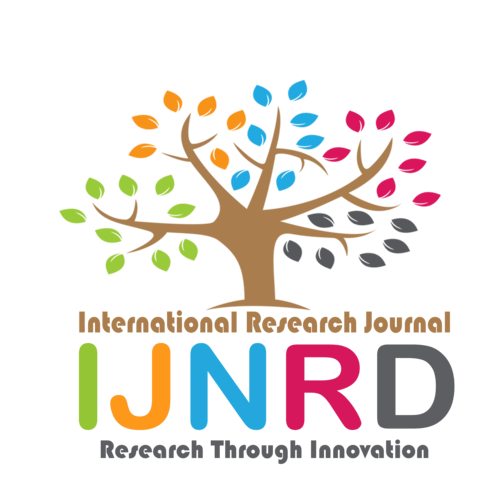|
|||||||||||||||

|
INTERNATIONAL JOURNAL OF NOVEL RESEARCH AND DEVELOPMENT International Peer Reviewed & Refereed Journals, Open Access Journal ISSN Approved Journal No: 2456-4184 | Impact factor: 8.76 | ESTD Year: 2016 Scholarly open access journals, Peer-reviewed, and Refereed Journals, Impact factor 8.76 (Calculate by google scholar and Semantic Scholar | AI-Powered Research Tool) , Multidisciplinary, Monthly, Indexing in all major database & Metadata, Citation Generator, Digital Object Identifier(DOI) |
||||||||||||||
Issue: April 2024
Volume 9 | Issue 4
Review Result and Publication of Paper within : 2-3 days
Click Here For more DetailsFor Authors
Forms / Download
Published Issue Details
Editorial Board
Other IMP Links
Facts & Figure
Impact Factor : 8.76
Issue per Year : 12
Volume Published : 9
Issue Published : 95
Article Submitted :
Article Published :
Total Authors :
Total Reviewer :
Total Countries :
Indexing Partner
Join RMS/Earn 300
Licence
This work is licensed under a Creative Commons Attribution-NonCommercial 4.0 International License







|
Published Paper Details
|
|
| Paper Title: | OCCUPATIONAL STRESS MANAGEMENT OF MIDDLE LEVEL ADMINISTRATORS IN HIGHER EDUCATION INSTITUTIONS : BASIS FOR ORGANIZATIONAL POLICY INNOVATION |
| Authors Name: | SILVA RODITA |
| Download E-Certificate: | Download |
| Author Reg. ID: |
IJNRD_184250
|
| Published Paper Id: | IJNRD2202046 |
| Published In: | Volume 7 Issue 2, February-2022 |
| DOI: | |
| Abstract: | This study looked into the levels of stress of middle level administrators in higher education institutions as basis for organizational policy innovation. Specifically, it dealt on the following questions: (1.) What level of stress do the middle level administrators hold , when dealing with stressful situations brought about by the conflict encountered at the workplace? (2.) How did the respondents manage their stress when confronted with occupational conflict? ( 3.) Is there a significant difference in the level of stress of middle level administrators when data are grouped according to sex, age, type of school, and type of respondents? The study employed a descriptive quantitative - qualitative research design. It utilized survey-questionnaire for the quantitative data and interview guide questions for the focus grouped discussions for the qualitative data. A recorder was used to back up the qualitative data. Thirty six ( 36 ) respondent middle level administrators from the three ( 3 ) private ( sectarian and non-sectarian ) tertiary schools and three ( 3 ) public State, Colleges and Universities served as respondents of the study. Frequency and Ranking, T-test, Analysis of Variance ( ANOVA ) were the statistical tools used. Findings revealed that as to the level of stress of the respondent administrators, it came out to be: DOING FINE/NO STRESS. Moreover,there was no significant difference in the levels of stress among the respondents when data were classified according to the following variables: sex, age, and type of respondents. However, there was a significant difference in the level of stress among the respondents,when data were grouped according to types of school. In the light of the above findings, it can be concluded that the respondent administrators were not stressed at all, despite the conflicts they met in their job. This has been brought by different educational backgrounds and family orientations and also their work- experiences which made them stronger in buffling the occupational stressors they encountered along the way. These found support in their varied responses during the interview. Finally, they were acting and practicing their respective professional ethics, as it came out that they managed to resolve the conflict by dealing with the problem with the concerned subordinates and talked it out in a professional confrontation. This was arrived at by the middle level administrators since they wanted the conflict settled immediately and professionally, then after that “professional talk with the concerned faculty and staff” everything was forgotten as if nothing has happened. This must be so, because they belonged to the same organization and for the organization to move on conflict must be settled. This found again support in the excerpts of the responses they made during the interview. It is highly recommended to have better organization that functions effectively and effeciently, the top academic managers should have regular stress management exercises and also give stress assessment on a regular basis to be able to determine the stress level of the administrators to avoid burn-out as this would have a great effect on the performance of their job. Faculty members will be included in the stress assessment, since they are part of the organization and they are one group where conflict arises. Department chairmen or program advisers for the middle level administrators, such as deans, associate deans and department chairmen or program advisers to value the “ culture of professionalism “ in all dealings with subordinates and among themselves and to give time and priority to INTERPERSONAL RELATIONSHIP ( IPR )of all the MEMBERS IN THE ORGANIZATION, as this will enhance their social relationships with one another and even spiritual relationship with their GOD. This should be a MUST to all faculty ,staff and members in the college to be led by the Dean. |
| Keywords: | Occupational Stress, Managing Stress Level, Interpersonal Relationship, Organizational Policy Innovation, |
| Cite Article: | "OCCUPATIONAL STRESS MANAGEMENT OF MIDDLE LEVEL ADMINISTRATORS IN HIGHER EDUCATION INSTITUTIONS : BASIS FOR ORGANIZATIONAL POLICY INNOVATION", International Journal of Novel Research and Development (www.ijnrd.org), ISSN:2456-4184, Vol.7, Issue 2, page no.402-418, February-2022, Available :http://www.ijnrd.org/papers/IJNRD2202046.pdf |
| Downloads: | 000118759 |
| ISSN: |
2456-4184 | IMPACT FACTOR: 8.76 Calculated By Google Scholar| ESTD YEAR: 2016 An International Scholarly Open Access Journal, Peer-Reviewed, Refereed Journal Impact Factor 8.76 Calculate by Google Scholar and Semantic Scholar | AI-Powered Research Tool, Multidisciplinary, Monthly, Multilanguage Journal Indexing in All Major Database & Metadata, Citation Generator |
| Publication Details: |
Published Paper ID:IJNRD2202046 Registration ID: 184250 Published In: Volume 7 Issue 2, February-2022 DOI (Digital Object Identifier): Page No: 402-418 Country: -, -, - Research Area: Engineering Publisher : IJ Publication Published Paper URL : https://www.ijnrd.org/viewpaperforall?paper=IJNRD2202046 Published Paper PDF: https://www.ijnrd.org/papers/IJNRD2202046 |
| Share Article: | |
|
Click Here to Download This Article |
|
| Article Preview | |
|
|
|
Major Indexing from www.ijnrd.org
| Semantic Scholar | Microsaoft Academic | ORCID | Zenodo |
| Google Scholar | ResearcherID Thomson Reuters | Mendeley : reference manager | Academia.edu |
| arXiv.org : cornell university library | Research Gate | CiteSeerX | PUBLON |
| DRJI | SSRN | Scribd | DocStoc |
ISSN Details
 |
 |
ISSN: 2456-4184
Impact Factor: 8.76 and ISSN APPROVED
Journal Starting Year (ESTD) : 2016
DOI (A digital object identifier)
Conference
Open Access License Policy
Important Details
Social Media
| Copyright © 2024 - All Rights Reserved - IJNRD |












Facebook Twitter Instagram LinkedIn